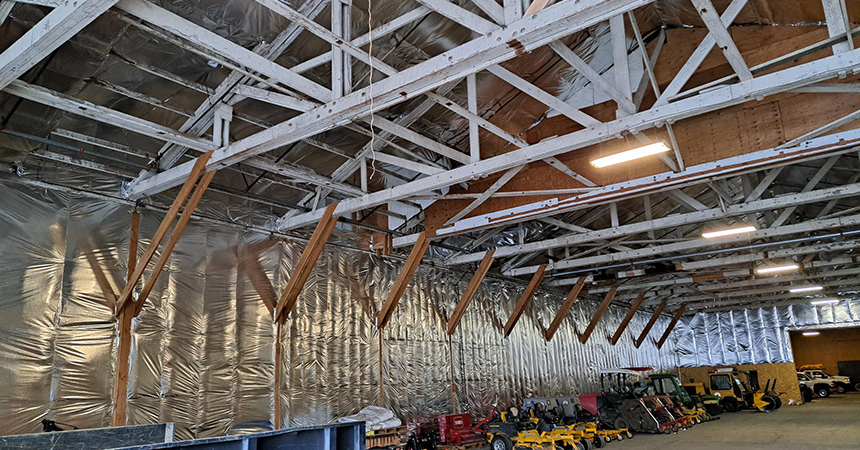
Dusty Hood, parks and facilities division manager for the City of Redmond Public Works Department, was in the midst of a roof replacement project for one of the city’s warehouse buildings when he noticed major issues with the roof’s insulation as well.
“It was an old metal roof with three layers of tar on it,” said Hood. “The insulation was so old, it crumbled and leaked.”
He soon realized that fixing the leaky roof of the 17,500-square-foot warehouse was just the beginning of the project he originally pursued. The facility, used by his department to store 95 percent of the city’s parks and street equipment, was uncomfortable for employees who spend time in the facility year-round, working on equipment and other tasks every day.
In fact, the warehouse had such poor insulation that Hood’s team referred to it as “cold storage” because of how cold it got in the wintertime. “It really did feel like cold storage. It was also extremely hot in the summertime and, obviously, had horrible energy efficiency,” Hood said.
In addition to the building’s poor energy performance, equipment suffered in the wintertime. Equipment, including backhoes and mowers, were taking more time to start, the oil was cold, and vehicles had to idle for long periods of time, wasting fuel and energy.
Following a site visit from an Energy Trust of Oregon energy advisor, Hood discovered that there were cash incentives available to replace the facility’s current roof and wall insulation. And, thanks to increased incentive amounts for insulation, incentives would cover the entire project cost.
“I was told that I could insulate the rest of the facility for almost nothing. That’s what really moved the project along,” Hood said.
In total, the City of Redmond received nearly $55,000 in cash incentives for installing new, high-performance roof and wall insulation, with zero out-of-pocket costs. And the savings were dramatic: the city will save over $33,800 annually on utility bills as a result of the warehouse’s improved energy efficiency.
The process of applying for incentives was easy, self-explanatory, and straightforward, too, Hood said. “Having an Energy Trust energy advisor available to help was key. Not only did they complete most of the paperwork, but they also provided additional options and other available incentives with their on-site visits in case we wanted to move forward with other projects in the future. Their energy-efficiency knowledge was off the charts,” said Hood.
Hood and his department are saving a tremendous amount of money on utility bills with the upgraded warehouse insulation, while the life of stored equipment has been extended due to less time spent warming up during the wintertime.
“Energy Trust cash incentives have had such a wide-reaching effect, from saving money up front, to helping the environment and increasing people’s health. I’d highly recommend to those on the commercial side doing any upgrades to facilities or getting ready to build a new facility to explore incentives. Go through the entire list to see where you can save money, not just upfront but in the long term too.”
Learn more about how you can save energy at your business through insulation upgrades with support from Energy Trust. Visit our cash incentives page here or get started on your energy-saving project by emailing existingbuildings@energytrust.org.
